

100 Search Engines For Academic Research. Back in 2010, we shared with you 100 awesome search engines and research resources in our post: 100 Time-Saving Search Engines for Serious Scholars.
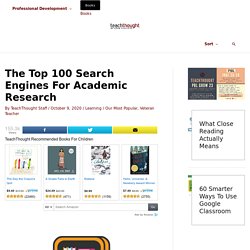
It’s been an incredible resource, but now, it’s time for an update. Some services have moved on, others have been created, and we’ve found some new discoveries, too. Many of our original 100 are still going strong, but we’ve updated where necessary and added some of our new favorites, too. Check out our new, up-to-date collection to discover the very best search engine for finding the academic results you’re looking for. General Need to get started with a more broad search? iSEEK Education:iSeek is an excellent targeted search engine, designed especially for students, teachers, administrators, and caregivers. Meta Search Want the best of everything? Dogpile:Find the best of all the major search engines with Dogpile, an engine that returns results from Google, Yahoo! Databases and Archives Books & Journals Science Math & Technology Social Science.
Ask Why Your Students Want to Learn English. “Well begun is half done.”
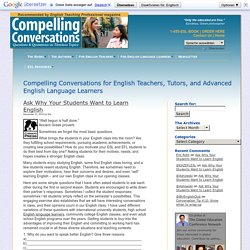
Ancient Greek proverb Sometimes we forget the most basic questions. What brings the students in your English class into the room? Are they fulfilling school requirements, pursuing academic achievements, or creating new possibilities? How do you motivate your ESL and EFL students to do their best from day one? Many students enjoy studying English, some find English class boring, and a few students resent studying English. Here are some simple questions that I have often asked students to ask each other during the first or second lesson. 1. Newsletters. Basic Business Letters. Parts of a Business Letter This resource is organized in the order in which you should write a business letter, starting with the sender's address if the letter is not written on letterhead.
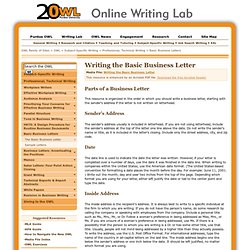
Sender's Address The sender's address usually is included in letterhead. If you are not using letterhead, include the sender's address at the top of the letter one line above the date. Do not write the sender's name or title, as it is included in the letter's closing. Date The date line is used to indicate the date the letter was written. Inside Address The inside address is the recipient's address. Salutation Use the same name as the inside address, including the personal title. If you don't know a reader's gender, use a nonsexist salutation, such as their job title followed by the receiver's name. Body For block and modified block formats, single space and left justify each paragraph within the body of the letter. Closing Enclosures Typist initials A Note About Format and Font Block Format Modified Block Font. Business Letters. What this handout is about This handout will help you write business letters required in many different situations, from applying for a job to requesting or delivering information.
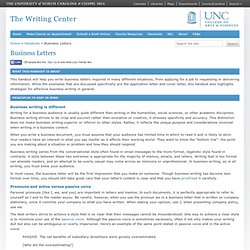
While the examples that are discussed specifically are the application letter and cover letter, this handout also highlights strategies for effective business writing in general. Principles to keep in mind Business writing is different Writing for a business audience is usually quite different than writing in the humanities, social sciences, or other academic disciplines. When you write a business document, you must assume that your audience has limited time in which to read it and is likely to skim. Business writing varies from the conversational style often found in email messages to the more formal, legalistic style found in contracts. In most cases, the business letter will be the first impression that you make on someone. Pronouns and active versus passive voice Focus and specificity Application letters.
Letter Writing. Gramat35. BALEAP - The Global Forum for EAP Professionals. Lu Zhongshe 1.
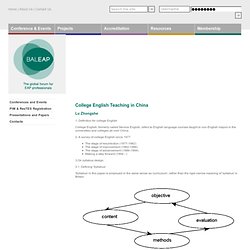
Definition for college English College English, formerly called Service English, refers to English language courses taught to non-English majors in the universities and colleges all over China. 2. A survey of college English since 1977 The stage of resurrection (1977-1982)The stage of improvement (1982-1986)The stage of advancement (1986-1994)Making a step forward (1994 - ) 3.On syllabus design 3.1. 'Syllabus' in this paper is employed in the same sense as 'curriculum', rather than the rigid narrow meaning of 'syllabus' in Britain. 3.2.
Chinese linguists and English language teachers agreed that a national English syllabus IS necessary, which should serve as a guideline in all the universities and colleges. 3.3. Productive syllabus: traditional syllabusstructural syllabuslexical syllabussemantic syllabus: situational/notional/functional Process syllabus: Process syllabusProcedural syllabus.